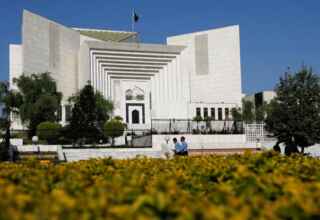
The Monetary Policy Committee (MPC) of the State Bank of Pakistan (SBP) has raised the key interest rate by 300 basis points, taking it to 20%, as it bids to control runaway inflation.
“At its meeting held on 2nd March 2023, the MPC decided to increase the policy rate by 300 basis points to 20%,” it said in a statement, in which it also announced moving the next MPC meeting to April 4 from April 27.
“During the last meeting in January, the Committee had highlighted near-term risks to the inflation outlook from external and fiscal adjustments. Most of these risks have materialised and are partially reflected in the inflation outturns for February. The national CPI inflation has surged to 31.5 percent y/y, while core inflation rose to 17.1 percent in urban and 21.5 percent in rural basket in February 2023.”
The MPC statement said that in today’s meeting, the committee noted that the recent fiscal adjustments and exchange rate depreciation have led to a significant deterioration in the near term inflation outlook and a further upward drift in inflation expectations, as reflected in the latest wave of surveys.
“The Committee expects inflation to rise further in the next few months as the impact of these adjustments unfolds before it begins to fall, albeit at a gradual pace.
“The average inflation this year is now expected in the range of 27 – 29 percent against the November 2022 projection of 21 – 23 percent. In this context, the MPC emphasised that anchoring inflation expectations is critical and warrants a strong policy response.”
On the external side, the MPC noted that despite a substantial reduction in the current account deficit (CAD), vulnerabilities continue to persist.
“In January 2023, the CAD fell to $242 million, the lowest level since March 2021. Cumulatively, the CAD – at $3.8 billion in Jul-Jan FY23 – is down 67 percent compared to the same period last year. Notwithstanding this improvement, scheduled debt repayments and a decline in financial inflows amid rising global interest rates and domestic uncertainties, continue to exert pressure on FX reserves and the exchange rate.”
The MPC noted that FX reserves remain low and concerted efforts are needed to improve the external position. In this regard, conclusion of the ongoing 9th review under the IMF’s EFF will help address near-term external sector challenges. Furthermore, the MPC stressed on the urgent need for energy conservation measures to alleviate pressure on the external account and meet the import requirements of other sectors.
“Recent fiscal measures – including an increase in GST and excise duties, reduction in subsidies, adjustments in energy prices, and the austerity drive – are expected to help contain the otherwise widening fiscal and primary deficits. As highlighted in earlier statements, the envisaged fiscal consolidation is critical for economic stability and will complement the ongoing monetary tightening in bringing down inflation over the medium-term.”
The Committee emphasised that any significant fiscal slippages will undermine monetary policy effectiveness in the context of achieving the price stability objective.






